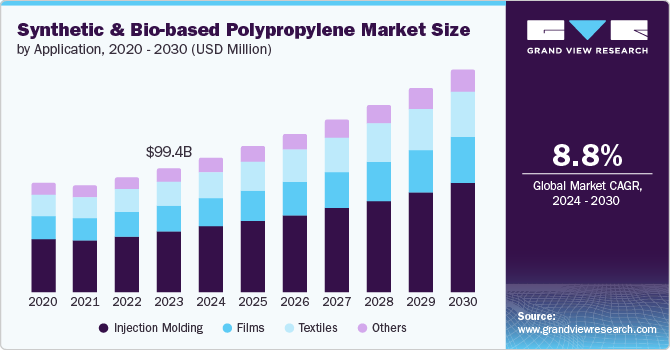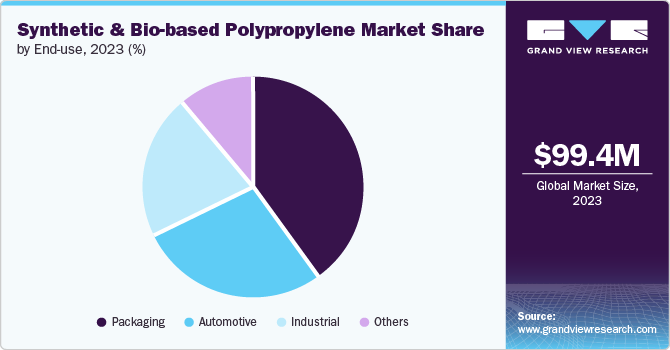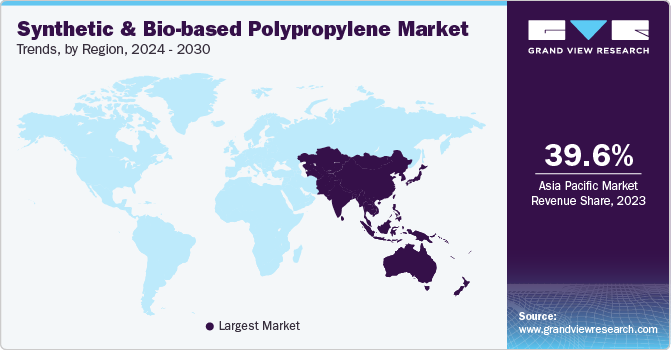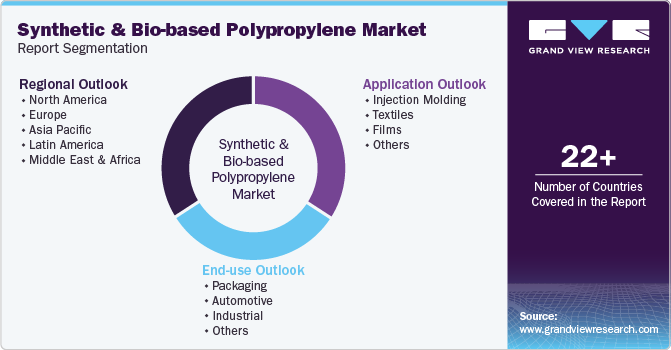
Synthetic And Bio-based Polypropylene Market Size, Share & Trends Analysis Report By End Use (Packaging, Automotive, Industrial, Others), By Application, By Region, And Segment Forecasts, 2024 - 2030
- Report ID: 978-1-68038-429-1
- Number of Report Pages: 100
- Format: PDF
- Historical Range: 2018 - 2022
- Forecast Period: 2024 - 2030
- Industry: Bulk Chemicals
Market Size & Trends
The global synthetic and bio-based polypropylene market size was valued at USD 99.4 million in 2023 and is projected to grow at a CAGR of 8.8% from 2024 to 2030. With rising awareness about the detrimental effects of traditional plastics on the environment, there is a growing demand for sustainable alternatives such as bio-based polypropylene. Consumers are becoming more conscious of their carbon footprint and actively seeking eco-friendly and biodegradable products.

This shift in consumer preferences has led to a surge in the adoption of bio-based polypropylene sourced from renewable resources such as sugarcane, corn, or other biomass sources. Additionally, stringent regulations aimed at promoting sustainable practices and reducing plastic waste have further boosted the growth of the bio-based polypropylene market. Biotechnology and polymer chemistry innovations have enabled manufacturers to develop bio-based polypropylene with properties comparable to traditional synthetic polypropylene. These technological advancements have improved the performance characteristics of synthetic and bio-based polypropylene and made it more cost-effective and commercially viable. As a result, industries such as packaging, automotive, textiles, and healthcare increasingly incorporate bio-based polypropylene into their products to meet sustainability goals and cater to environmentally conscious consumers.
Application Insights
Injection molding dominated the market and accounted for a market revenue share of 48.4% in 2023. Polypropylene's attributes, such as high impact resistance, chemical inertness, and ability to be molded into complex shapes, make it highly suitable for injection molding applications. In automotive, packaging, electronics, and consumer goods, injection molding is crucial for manufacturing components ranging from automotive parts and household appliances to intricate packaging designs. The versatility of polypropylene in injection molding processes enables manufacturers to achieve lightweight, durable, and cost-effective products, driving sustained demand in the global market.
The textiles segment is expected to witness growth at 8.9% CAGR. As consumers become more environmentally conscious, there is a growing preference for textiles made from synthetic and bio-based polypropylene derived from renewable resources such as plants. This shift towards sustainability drives manufacturers to innovate and develop new bio-based polypropylene materials for textiles. Synthetic polypropylene offers durability, water resistance, and strength, making it ideal for technical textiles, sportswear, and outdoor gear applications. The versatility of synthetic polypropylene allows textile manufacturers to create innovative products that meet the evolving needs of consumers.
End Use Insights
The packaging segment accounted for the largest market revenue share in 2023. The increasing consumer demand for green products and sustainable packaging solutions has compelled companies to incorporate synthetic bio-based polypropylene into their offerings. The shift towards environmentally friendly practices and products is reshaping the packaging industry, with bio-based materials gaining traction due to their positive environmental impact and recyclability features.

The automotive segment is expected to register the fastest CAGR during the forecast period. The automotive sector’s continuous efforts to enhance fuel efficiency and reduce vehicle weight drive the adoption of lightweight materials like synthetic and bio-based polypropylene. This material offers a favorable strength-to-weight ratio, making it an attractive choice for components where weight reduction is critical, such as interior parts, under-the-hood applications, and structural components. The need for improved fuel economy and overall performance propels the demand for synthetic and bio-based polypropylene in the automotive segment.
Regional Insights
North America synthetic bio-based polypropylene market is anticipated to witness significant growth in the Synthetic bio-based polypropylene market. Synthetic and bio-based polypropylene are recyclable and can be reused in a wide range of applications, allowing companies to reduce their carbon footprint. As regulations become stricter regarding traditional plastics, the demand for synthetic polypropylene as an eco-friendly alternative is expected to rise significantly in the North American market. The automotive and textile industries in North America are major consumers of polypropylene. As these industries strive for lighter materials and environmental responsibility, bio-PP presents a compelling option.

U.S. Synthetic And Bio-based Polypropylene Market Trends
The synthetic bio-based polypropylene market in the U.S. is anticipated to witness significant growth in the synthetic and bio-based polypropylene market. The United States has a strong manufacturing industry focuses on developing new technologies. It allows for the ongoing improvement and use of synthetic polypropylene in numerous fields. The U.S. government's support for renewable energy and sustainable practices further encourages investment and research in bio-based technologies, positioning bio-based polypropylene as a promising solution to meet both environmental goals and market demands in the U.S.
Asia Pacific Synthetic And Bio-based Polypropylene Market Trends
The Asia Pacific synthetic and bio-based polypropylene market dominated in 2023. This growth owes to significantly increasing environmental awareness and government regulations. Consumers across the Asia Pacific are becoming increasingly conscious of the environmental impact of traditional plastics. Bio-based polypropylene offers a more sustainable alternative to renewable resources like plant-based materials.
The Chinese government is actively promoting a "green economy." Policies like the "Plastic Pollution Prevention and Control Action Plan" (2020-2025) and restrictions on single-use plastics drive the demand for sustainable alternatives like bio-PP.
Europe Synthetic And Bio-based Polypropylene Market Trends
Europe synthetic bio-based polypropylene market was identified as a lucrative region in this industry. The European Union's commitment to sustainability through initiatives such as the Circular Economy Action Plan and the Green Deal drives market demand for bio-based materials. These policies incentivize industries to adopt bio-based solutions and reduce dependency on fossil fuels. The development of advanced bio-refining technologies and partnerships between industry stakeholders and research institutions further bolster the growth of bio-based polypropylene in Europe.
The UK synthetic and bio-based market is expected to grow rapidly in the coming years. The UK government has promoted bio-based materials through policies that incentivize sustainable practices and penalize excessive use of traditional plastics. For instance, initiatives like the Plastics Pact aim to reduce single-use plastics and promote recycling, creating a favorable environment for adopting bio-based alternatives such as synthetic and polypropylene.
Key Synthetic And Bio-based Polypropylene Company Insights
Some of the key companies in the synthetic and bio-based polypropylene market include Braskem, Dow Inc., Borealis AG, LyondellBasell Industries Holdings B.V., Total S.A., Trellis Bioplastics, BioAmber Inc. and NatureWorks LLC, Vendors in the market are focusing on increasing customer base to gain a competitive edge in the industry. Therefore, key players are taking several strategic initiatives, such as mergers and acquisitions, and partnerships with other major companies.
-
Braskem offers a diverse range of products for various industrial and consumer applications. The company's portfolio includes traditional synthetic polypropylene derived from fossil fuels and bio-based polypropylene derived from renewable sources such as sugarcane.
-
Borealis AG offers a wide range of polypropylene products tailored to the diverse needs of industries such as automotive, packaging, construction, and healthcare. Borealis provides advanced polymer technology and manufacturing capabilities to deliver innovative solutions that enhance product performance and efficiency for its customers worldwide.
Key Synthetic And Bio-based Polypropylene Companies:
The following are the leading companies in the synthetic and bio-based polypropylene market. These companies collectively hold the largest market share and dictate industry trends.
- Braskem
- Dow Inc.
- Borealis AG
- LyondellBasell Industries Holdings B.V.
- Total S.A.
- Trellis Bioplastics
- BioAmber Inc.
- NatureWorks LLC
- Danimer Scientific
- Novamont S.p.A.
- FKuR Kunststoff GmbH
- Corbion N.V.
- Biobent Polymers
- GreenMantra Technologies
- Mitsui Chemicals, Inc.
- PolyOne Corporation
- Ravago Manufacturing Americas
- PlastiComp, Inc.
- Toray Industries, Inc.
- Toyota Tsusho Corporation
- Zebra Medical Vision, Inc.
Recent Developments
-
In January 2023, Braskem announced a project to assess the feasibility of producing carbon-negative bio-based polypropylene (PP) in the United States. The project would leverage Braskem's proprietary technology to convert bioethanol into segregated bio-based PP.
-
In Mar 2024, Braskem collaborated with Shell Chemicals to introduce certified bio-attributed and bio-circular polypropylene to the U.S. market. This collaboration signifies Shell Chemicals and Braskem's constant effort to pioneer innovative polypropylene production practices.
Synthetic And Bio-based Polypropylene Market Report Scop
|
Report Attribute |
Details |
|
Market size value in 2023 |
USD 107.8 million |
|
Revenue forecast in 2030 |
USD 178.8 million |
|
Growth Rate |
CAGR of 8.8% from 2024 to 2030 |
|
Base year for estimation |
2023 |
|
Historical data |
2018 - 2022 |
|
Forecast period |
2024 - 2030 |
|
Quantitative units |
Revenue in USD Million and CAGR from 2024 to 2030 |
|
Report coverage |
Revenue forecast, company ranking, competitive landscape, growth factors, and trends |
|
Segments covered |
Application, end use, region |
|
Regional scope |
North America, Europe, Asia Pacific, Latin America, MEA |
|
Country scope |
U.S., Canada, Mexico, Germany, UK, France, Italy, Spain, Russia, Denmark, Sweden, Norway, China, Indonesia, Vietnam, Japan, India, South Korea, Australia, Brazil, Argentina, Saudi Arabia, Kuwait, UAE, South Africa |
|
Key companies profiled |
Braskem;Dow Inc.;Borealis AG;LyondellBasell Industries Holdings B.V.;Total S.A.;Trellis Bioplastics;BioAmber Inc.;NatureWorks LLC;Danimer Scientific;Novamont S.p.A.;FKuR Kunststoff GmbH;Corbion N.V.;Biobent Polymers;GreenMantra Technologies;Mitsui Chemicals, Inc.;PolyOne Corporation;Ravago Manufacturing Americas;PlastiComp, Inc.;Toray Industries, Inc.;Toyota Tsusho Corporation |
|
Customization scope |
Free report customization (equivalent up to 8 analysts working days) with purchase. Addition or alteration to country, regional & segment scope. |
|
Pricing and purchase options |
Avail customized purchase options to meet your exact research needs. Explore purchase options |
Global Synthetic And Bio-based Polypropylene Market Report Segmentation
This report forecasts revenue growth at global, regional, and country levels and provides an analysis of the latest industry trends in each of the sub-segments from 2018 to 2030. For this study, Grand View Research has segmented the global synthetic and bio-based polypropylene market report based on application and end use.

-
Application Outlook (Revenue, USD Million, 2018 - 2030)
-
Injection Molding
-
Textiles
-
Films
-
Others
-
-
End Use Outlook (Revenue, USD Million, 2018 - 2030)
-
Packaging
-
Automotive
-
Industrial
-
Others
-
-
Regional Outlook (Revenue, USD Million, 2018 - 2030)
-
North America
-
U.S.
-
Canada
-
Mexico
-
-
Europe
-
Germany
-
UK
-
France
-
Italy
-
Spain
-
Russia
-
Denmark
-
Sweden
-
Norway
-
-
Asia Pacific
-
China
-
Japan
-
India
-
South Korea
-
Australia
-
Vietnam
-
-
Latin America
-
Brazil
-
Argentina
-
-
Middle East and Africa (MEA)
-
South Arabia
-
UAE
-
South Africa
-
Kuwait
-
-
We are committed towards customer satisfaction, and quality service.
"The quality of research they have done for us has been excellent."




